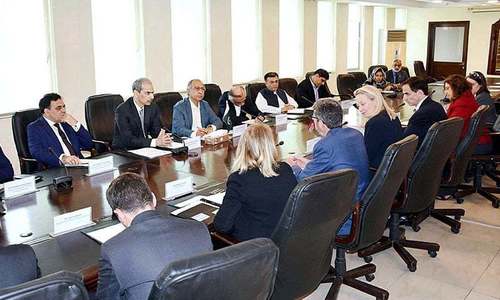ISLAMABAD: The government has banned a nationalist and two separatist organisations of Sindh, bringing the total number of the proscribed outfits in the country to 76.
Informed sources told Dawn that the Jeay Sindh Qaumi Mahaz-Aresar Group (JSQM-A), Sindhu Desh Revolution Army (SRA) and Sindhu Desh Liberation Army (SLA) were the latest addition to the list of banned organisations during the current year.
The process of maintaining a list of proscribed organisations started on Aug 14, 2001 when Lashkar-e-Jhangvi and Sipah-i-Mohammad Pakistan were outlawed. Later, on Jan 14, 2002, the government banned the Jaish-e-Mohammad, Lashkar-e-Taiba, Sipah-i-Sahaba Pakistan, Tehreek-i-Islami and Tehreek-i-Nifaz Shariat-i-Mohammadi.
The Tehreek-i-Jafria Pakistan was put on the list on Jan 28, 2002, followed by Al Qaeda on March 17, 2003, Millat-i-Islamia Pakistan and Khuddamul Islam on Nov 15, 2003 and Islami Tehreek Pakistan on Nov 15, 2003.
Three more organisations — Jamiatul Ansar, Jamiatul Furqan and Hizbut Tehrir — were banned on Nov 20, 2003, while Khair-un-Naas International Trust was proscribed on Oct 27, 2004.
The Balochistan Liberation Army (BLA) was placed on the list on April 7, 2006, and the Islamic Students Movement of Pakistan on Aug 21, 2006.
The number of outlawed organisations across the country reaches 76
The Lashkar-i-Islam, Ansarul Islam and Haji Namdar Group were banned on June 30, 2008, and the Tehreek-i-Taliban Pakistan was outlawed on Aug 25, 2008.
Five militant organisations from Balochistan — the Balochistan Republican Army, Balochistan Liberation Front, Lashkar-i-Balochistan, Balochistan Liberation United Front and Balochistan Musallah Difa Tanzeem — were put on the list on Sept 8, 2010.
Three organisations from Gilgit — the Shia Tulaba Action Committee, Markaz Sabeel Organisation and Tanzeem Naujawanan-i-Ahle Sunnat — and Peoples Aman Committee (Lyari), Karachi, were placed on the same list on Oct 10, 2011.
The Ahle Sunnat Wal Jamaat, a reincarnation of the Sipah-i-Sahaba Pakistan, was banned on Feb 15, 2012, followed by the Al Harmain Foundation and Rabita Trust on March 6, 2012 and Anjuman-i-Imamia and Muslim Students Organisation (both from Gilgit-Baltistan) on April 24, 2012.
The Tanzeem Ahle Sunnat Wal Jamaat (Gilgit-Baltistan) was placed on the list on June 5, 2012, while Balochistan Bunyad Parast Army, Tehreek Nafaz-i-Aman, Tahaffuz Hadudullah, Balochistan Waja Liberation Army, Islam Mujahideen, Jaish-i-Islam and Balochistan National Liberation Army were banned on Aug 4, 2012.
The list was widely expanded in 2013 with the addition of the Khana-i-Hikmat Gilgit-Baltistan on March 13 and Tehreek-i-Taliban-Swat, Tehreek-i-Taliban-Mohmand, Tariq Jeedar Group, Abdullah Azam Brigade, East Turkmenistan Islamic Movement, Islamic Movement of Uzbekistan, Islamic Jihad Union, 313 Brigade, Tehreek-i-Taliban-Bajaur, Amar Bil Maroof Wa Nahi Anil Munkir (Haji Namdar Group), Baloch Student Organisation-Azad, United Baloch Army and Jeay Sindh Muttahida Mahaz on March 15, 2013.
Since then, the list remained unchanged till July 15, 2015, when the name of Daesh (the Arabic acronym for the militant Islamic State group) was placed on the list of banned organisations.
The Jamaat-ul-Ahrar and Lashkar-e-Jhangvi Al-Alami were added to the list on Nov 11, 2016, followed by Ansarul Hussain on Dec 30, 2016.
The Tehreek-i-Azadi Jammu and Kashmir was the only addition made to the list in 2017. The organisation was outlawed on June 8, 2017. Jundullah was the last addition made by the then PML-N government in 2018.
The first addition to the list by the Pakistan Tehreek-i-Insaf government had been made on Dec 13, 2018, when Yemen-based Al-Rahmah Welfare Trust Organisation was outlawed.
The Balwaristan National Front (Abdul Hameed Khan Group) was the first organisation to have been proscribed in 2019, with the issuance of a formal notification on Feb 26.
The decision to ban the Jamaatud Dawa (JuD) and Falah-i-Insaniyat Foundation (FIF) was taken at a meeting of the National Security Committee, headed by the prime minister and comprising key cabinet members and military leaders on Feb 21 last year, but a notification by the interior ministry to that effect was issued on March 5, 2019.
After a gap of over two months as many as seven JuD and two FIF affiliates were also included in the list with a sub-heading below the parent organisations.
The Pak-Turk International CAG Education Foundation was banned on April 18, 2019.
The Hizbul Ahrar (HuA) and Balochistan Raaji Ajori-R-Sangar (BRAS) were added to the list of terrorist outfits on July 26,2019.
The Ghulaman-i-Sahaba and Maymar Trust continue to be on a watch list since May 30, 2017 and March 29, 2017, respectively.
The Sachal Sarmast Welfare Trust Karachi and Al-Jaza Patient Welfare Organisation were added to the watch list in June last year.
The Al-Akhtar Trust and Al-Rasheed Trust have been on the list under the UN Security Council resolution No 1267 since December 2005.
Published in Dawn, May 12th, 2020














































